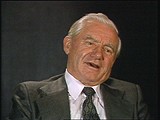<< Previous | Displaying results 481-490 of 571 for "" | Next >>
-
Morris Kornberg describes arrival at Auschwitz
Oral HistoryMorris grew up in a very religious Jewish household and was active in a Zionist sports league. When the Germans invaded Poland in September 1939, Morris's town was severely damaged. Morris's family was forced to live in a ghetto, and Morris was assigned to forced labor. After a period of imprisonment in Konskie, a town about 30 miles from Przedborz, Morris was deported to the Auschwitz camp. He was assigned to the Jawischowitz subcamp of Auschwitz. In January 1945, Morris was forced on a death march and…
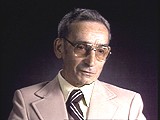
-
Ruth Webber describes witnessing a brutal punishment in the camp at Ostrowiec
Oral HistoryRuth was four years old when the Germans invaded Poland and occupied Ostrowiec. Her family was forced into a ghetto. Germans took over her father's photography business, although he was allowed to continue working outside the ghetto. Before the ghetto was liquidated, Ruth's parents sent her sister into hiding, and managed to get work at a labor camp outside the ghetto. Ruth also went into hiding, either in nearby woods or within the camp itself. When the camp was liquidated, Ruth's parents were split up.…

-
Abraham Bomba describes gassing operations at Treblinka
Oral HistoryDescribes gassing operations at Treblinka
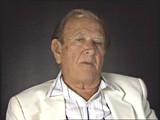
-
Abraham Bomba describes the Treblinka gas chambers
Oral HistoryExcerpt from Holocaust survivor Abraham Bomba's oral history testimony describing gas chambers at the Treblinka killing center.
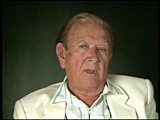
-
Esther Raab recalls the arrival of transports in Sobibor
Oral HistoryEsther was born to a middle-class Jewish family in Chelm, Poland. In December 1942, she was deported from a work camp to the Sobibor killing center in occupied Poland. Upon arrival at Sobibor, Esther was selected to work in a sorting shed. She sorted clothing and the possessions of the people killed at the camp. During the summer and fall of 1943, Esther was among a group of prisoners in the Sobibor camp who planned an uprising and escape. Leon Feldhendler and Aleksandr (Sasha) Pechersky were the leaders…
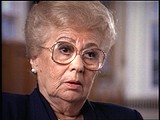
-
Tomasz (Toivi) Blatt describes gassing operations in the Sobibor killing center
Oral HistoryTomasz was born to a Jewish family in Izbica. After the war began in September 1939, the Germans established a ghetto in Izbica. Tomasz's work in a garage initially protected him from roundups in the ghetto. In 1942 he tried to escape to Hungary, using false papers. He was caught but managed to return to Izbica. In April 1943 he and his family were deported to Sobibor. Tomasz escaped during the Sobibor uprising. He went into hiding and worked as a courier in the Polish underground.
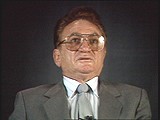
-
Sam Itzkowitz describes the gas chambers in Auschwitz
Oral HistoryThe Germans invaded Poland in September 1939. When Makow was occupied, Sam fled to Soviet territory. He returned to Makow for provisions, but was forced to remain in the ghetto. In 1942, he was deported to Auschwitz. As the Soviet army advanced in 1944, Sam and other prisoners were sent to camps in Germany. The inmates were put on a death march early in 1945. American forces liberated Sam after he escaped during a bombing raid.
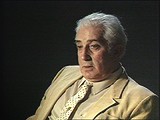
-
Ruth Meyerowitz describes her memories of the Auschwitz crematoria
Oral HistoryIn Frankfurt, Ruth's family faced intensifying anti-Jewish measures; her father's business was taken over and Ruth's Jewish school was closed. In April 1943, Ruth and her family were deported to Auschwitz. Ruth was selected for forced labor and assigned to work on road repairs. She also worked in the "Kanada" unit, sorting possessions brought into the camp. In November 1944, Ruth was transferred to the Ravensbrueck camp system, in Germany. She was liberated in May 1945, during a death march from the…
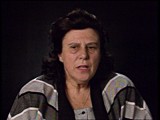
-
Franz Wohlfahrt describes the trial and sentencing of his father
Oral HistoryFranz and his family were Jehovah's Witnesses. Germany annexed Austria in 1938. After World War II began, Franz's father was executed because, as a Witness, he opposed war. In 1940, Franz refused to participate in military training and would not salute the Nazi flag. He was imprisoned, interrogated by the Gestapo (German Secret State Police) in Graz, and sentenced to five years of hard labor in a camp in Germany. Franz was liberated by US forces in 1945.
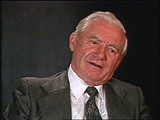
-
Franz Wohlfahrt describes imprisonment in Graz
Oral HistoryFranz and his family were Jehovah's Witnesses. Germany annexed Austria in 1938. After World War II began, Franz's father was executed because, as a Witness, he opposed war. In 1940, Franz refused to participate in military training and would not salute the Nazi flag. He was imprisoned, interrogated by the Gestapo (German Secret State Police) in Graz, and sentenced to five years of hard labor in a camp in Germany. Franz was liberated by US forces in 1945.
